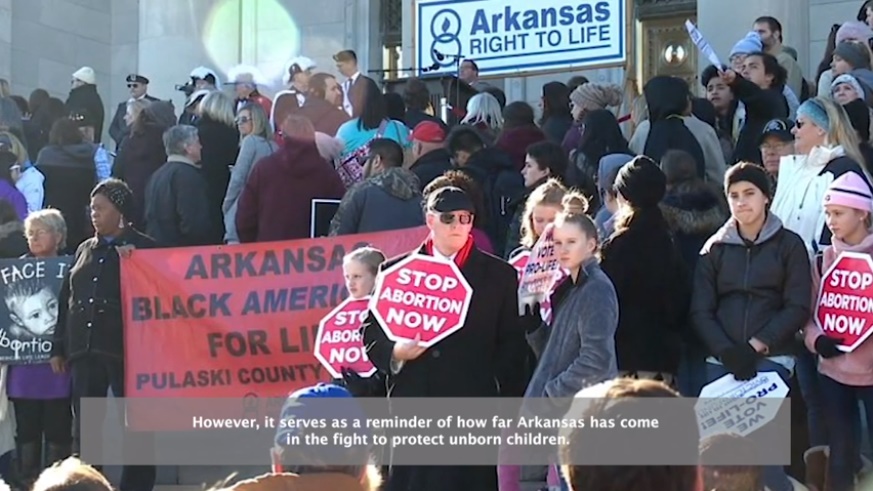Report Shows Good News In Arkansas’ Fight Against Abortion

The state Department of Health recently released its annual report on the number of abortions performed in Arkansas.
The report for 2018 shows abortion in Arkansas has fallen to levels not seen since 1977.
That’s really good news.
We’ve begun analyzing the report, along with data from previous years, and here is some of what we have found so far:
- Abortion in general is at a 42-year low in Arkansas.
- Teen abortion is at an all-time low.
- Arkansas is exporting fewer abortions to other states.
- Surgical abortions are down in Arkansas.
- Chemical abortions are on the rise in Arkansas.
- Single moms are most at risk for abortion in Arkansas.
Here’s a little more information about what we have found.
Good News: Abortion Is At Its Lowest Levels In 42 Years
There were 3,069 abortions in Arkansas in 2018. While that is still a staggering number, abortion has fallen to levels we haven’t seen since 1977.
Overall, the number of abortions performed every year in Arkansas has dropped by 28% since 2014, and it is less than half what it was in the early 1990’s.
Abortion has declined dramatically, and that is really good news.
Good News: Teen Abortion Is At An All-Time Low
In 1986 more than 2,000 abortions were performed on teenagers in Arkansas. Last year there were 307.
Thirty years ago teenagers were the most likely age group to have an abortion. Today they are the least likely.
Abortion has declined dramatically in Arkansas, but the most drastic decline has been among teen girls.
While we don’t have data on the number of abortions performed on teenagers in the 1970s, teen abortion in Arkansas appears to be at — or at least very close to — an all-time low in our state.
Good News: Arkansas is Exporting Fewer Abortions to Other States
For the fourth year in a row, the number of women coming to Arkansas from out-of-state for abortions has declined.
In the past, women from Missouri, Tennessee, Mississippi, and other states have traveled to Arkansas to have abortions. However, the number of abortions performed on women from out-of-state has fallen from 925 in 2014 to 321 last year.
Good News: Surgical Abortions Are Down in Arkansas
For the fourth year in a row, the number of surgical abortions performed in Arkansas declined.
In 2014 there were 3,665 surgical abortions in Arkansas. Last year there were 2,090.
Surgical abortion is a grisly procedure in which an unborn baby is physically torn apart, and it carries a number of serious health risks for the pregnant woman.
That’s why the Arkansas Legislature passed a law prohibiting some dismemberment abortion procedures in 2017. This good law has been tied up in court ever since.
Bad News: Chemical Abortions Are On the Rise in Arkansas
Unfortunately, not all the report’s news is good for Arkansas.
While the number of abortions has declined overall, the number of abortions performed using dangerous abortion drugs like RU-486 increased for the second year in a row in 2018.
The Arkansas Legislature has passed good legislation addressing chemical abortion, and that legislation that actually prompted Planned Parenthood temporarily to stop doing abortions in Arkansas last year.
Arkansas is winning the fight against abortion, but we still have work to do when it comes to restricting dangerous abortion drugs like RU-486.
Bad News: Single Moms are Most At Risk for Abortion
Since 2015, nearly 66% of abortions performed in Arkansas were on women who already had one or more children.
Roughly 86% of all abortions in Arkansas are performed on unmarried women.
Taken together, these figures indicate that the typical woman walking into an abortion clinic is a single mom who already has one or two children.
These figures highlight the importance of Arkansas’ pregnancy resource centers.
Pregnancy resource centers help women and families with unplanned pregnancies. From diapers and baby food to parenting classes and adoption referrals, they offer a little bit of everything — all free of charge.
These centers empower mothers to choose options besides abortion.
Conclusion
Later this month the state will release additional reports that ought to shed some light on the exact number of lives Arkansas’ pro-life laws are saving.
However, we can safely say Arkansans are winning the fight to protect unborn children.
Since 2015, the Arkansas Legislature has passed more than two dozen pro-life laws, and many of these laws are directly responsible for Arkansas’ dropping abortion rate.
Americans also are largely pro-life, and Arkansans are no exception.
Polling from the University of Arkansas shows most Arkansans believe abortion should be either completely illegal or legal only under certain circumstances — like rape, incest, or to save the life of the mother.
We want to build a culture that values innocent human life. The latest abortion numbers from the Arkansas Department of Health seem to indicate we are succeeding.



